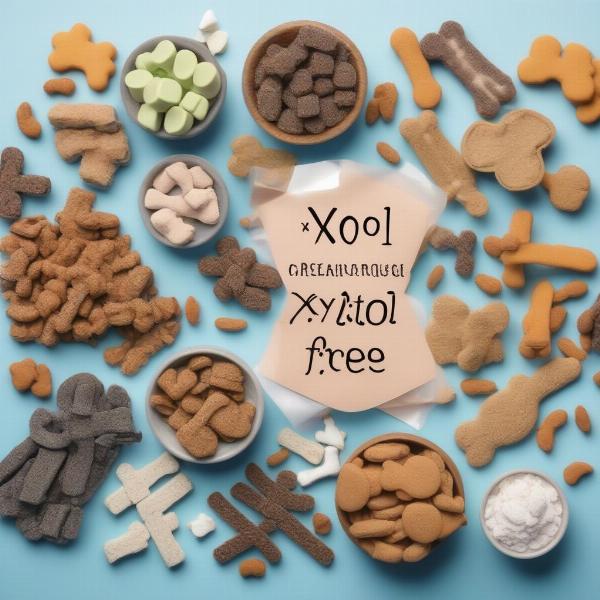Xylitol poisoning in dogs is a serious concern. If your dog ate gum with xylitol, swift action is crucial. This article will guide you through the necessary steps, explain the dangers of xylitol, and provide essential information for dog owners facing this frightening situation. Time is of the essence, so knowing what to do can make all the difference.
Understanding the Xylitol Danger
Xylitol is an artificial sweetener commonly found in sugar-free gum, candies, mints, and even some peanut butter brands. While harmless to humans, it is extremely toxic to dogs. Even small amounts of xylitol can cause a rapid release of insulin, leading to a dangerous drop in blood sugar (hypoglycemia). This can manifest in symptoms such as weakness, lethargy, vomiting, loss of coordination, seizures, and even liver failure in severe cases.
What to Do If Your Dog Ate Gum with Xylitol
If you suspect your dog ingested xylitol, do not wait for symptoms to appear. Contact your veterinarian or an emergency animal hospital immediately. Inform them of the type of gum or product ingested and the estimated amount of xylitol consumed. If possible, bring the packaging with you to the vet. Prompt veterinary intervention is essential for successful treatment.
Inducing Vomiting
Your veterinarian may advise you to induce vomiting at home only if instructed to do so. Never attempt this without professional guidance, as it can be harmful in certain situations.
Xylitol Poisoning Symptoms in Dogs
Recognizing the signs of xylitol poisoning is crucial. Symptoms can appear within minutes to hours after ingestion, and vary depending on the amount consumed. Be vigilant for any of the following:
- Weakness and Lethargy: Your dog may seem unusually tired or sluggish.
- Vomiting: This is a common early symptom.
- Loss of Coordination: Your dog might stumble, stagger, or have difficulty walking.
- Trembling or Seizures: These are signs of a severe drop in blood sugar.
- Jaundice (yellowing of the skin and gums): This indicates potential liver damage.
Preventing Xylitol Exposure
Prevention is always better than cure. Keep all xylitol-containing products out of your dog’s reach. Be mindful of guests who might unknowingly offer your dog gum or candy. When purchasing sugar-free products, always check the label for xylitol. Educate family members and friends about the dangers of xylitol for dogs.
 Xylitol-free dog treats
Xylitol-free dog treats
Choosing Safe Treats
Opt for xylitol-free treats specifically formulated for dogs. Many healthy and delicious alternatives are available. Always prioritize your dog’s safety when choosing treats.
Conclusion
If your dog ate gum with xylitol, immediate action is critical. Contact your veterinarian or an emergency animal hospital without delay. Early intervention can significantly improve your dog’s chances of recovery. Be vigilant about keeping xylitol-containing products away from your dog. By being informed and proactive, you can help ensure your furry friend’s safety and well-being.
FAQ
- How much xylitol is toxic to a dog? Even small amounts can be dangerous. The toxic dose varies depending on the dog’s size.
- Can xylitol poisoning be treated? Yes, with prompt veterinary care.
- What is the prognosis for a dog that ate xylitol? With early and aggressive treatment, the prognosis can be good.
- Are all sugar-free products toxic to dogs? No, but many contain xylitol, so always check the label.
- What are some safe alternatives to xylitol-sweetened products for humans? Natural sweeteners like stevia or erythritol are generally considered safe for dogs, but always consult with your veterinarian before giving your dog any new food.
- How can I prevent my dog from accessing xylitol-containing products? Store these items securely and educate family members and guests about the dangers.
- What should I do if I’m unsure whether a product contains xylitol? Err on the side of caution and keep it away from your dog.
Related Articles:
About ILM Dog:
ILM Dog is your trusted international resource for comprehensive dog care and wellbeing information. We offer expert advice on a wide range of topics, from breed selection and puppy care to senior dog health and training. Our mission is to empower dog owners worldwide with the knowledge and resources they need to provide their beloved companions with the best possible care. For personalized guidance or further assistance, please contact us at [email protected] or +44 20-3965-8624.